People in the UK could start actually receiving vaccines against coronavirus from December 9, according to a local health boss.
The NHS in Nottingham is gearing up to start doling out jabs in less than two weeks’ time, if one is given the green light by the drugs regulator.
None have yet been approved for public use — but the MHRA watchdog is already assessing one made by Pfizer and will start considering rival candidates made by AstraZeneca and Moderna in the coming weeks.
Ministers had wanted the country to be ready to go by December 1 so that as many people as possible could be vaccinated before the New Year.
But with a licence still pending the chances people will actually be invited to a clinic within the next five days are getting slimmer – although the UK may be on course to be the first country in the world to start vaccinating, Government sources believe.
Care home residents and staff will be first in line for a vaccine because the illness is most deadly for the elderly, and the Army is set to be drafted in to run the mammoth effort.
At a council meeting in Nottinghamshire this week one of the area’s top health chiefs said: ‘We would aim to go live, we believe, by Wednesday December 9, should a vaccine be available,’ Nottinghamshire Live reported.
Hopes of lifting Britain, and the world, out of a seemingly endless cycle of lockdowns and social distancing hinge on Covid jabs turning out to be successful and people volunteering to have them.
No vaccines have been given a licence for use on members of the public yet, but the UK’s drugs watchdog is assessing one made by Pfizer and could decide within days (Pictured: A vial of a vaccine made by AstraZeneca, which is also on track to be approved by the year end)
The timescale for vaccinations was laid out by the executive incident director at Nottingham and Nottinghamshire Clinical Commissioning Group (CCG), Sarah Carter.
The CCG directs all local NHS services in the area and said volunteers and extra staff were already being signed up to help deliver vaccines.
Ms Carter said: ‘We are aiming to have everything in place by Tuesday December 1, as per the national steer, and we would aim to go live, we believe, by Wednesday December 9, and the whole system is poised to move this forward.’
She added: ‘We’ve been working to prepare to deliver what will be, without doubt, the most unprecedented scale of vaccination programme that we’ve experienced.’
The Department of Health has not confirmed a national time frame for possible vaccinations if a jab is approved by the MHRA.
It said the programme was going as quickly as possible while following ‘robust standards’ and a spokesperson said: ‘We will publish further details on our deployment plans in due course.’
Health Secretary Matt Hancock called on the NHS to be ready for a December 1 start but the programme can’t start until the MHRA, the Medicines and Healthcare products Regulatory Agency, decides a vaccine is safe enough and good enough to give to the public.
HOW WILL THE UK VACCINATE A MILLION PEOPLE A DAY?
The Health Secretary has revealed ambitions to inoculate a million Brits against Covid every day as soon as a vaccinate is given the green light by the UK drugs watchdog.
Though Mr Hancock has admitted it was going to be ‘one of the biggest civilian projects in history’.
Normally the NHS vaccinates 15 million people against flu every year winter over the space of about four months.
The Government plans to set up dozens of mass coronavirus vaccination sites across the country in the coming weeks.
Doctors, nurses, firefighters and soldiers will be trained up to help deliver the inoculations.
Retired medics, medical students and other NHS staff who normally don’t give vaccines – including physiotherapists – are also being recruited.
GP surgeries have been told to organise the initial wave, which will involve using community centres, village halls, and practices themselves to administer the jabs to care workers and the elderly as soon as next month.
The NHS is establishing a series of much larger venues to inject millions of others once those at the top of the priority list have had the jabs.
Empty NHS Nightingale Hospitals and sports centres, including the Derby Arena, area are reportedly being lined up as possible venues.
Mr Hancock told Sky News the roll out should be ‘relatively straightforward’ because the NHS has the infrastructure.
But the health service will have to juggle the unprecedented Covid drive with the biggest flu vaccination programme ever – 30million people are being vaccinated on the NHS compared the 15million normally.
There is also the logistical problems with Pfizer’s vaccine – which looks set to be the first jab to be approved.
It needs to be stored at -70°C (-94°F), which means the UK will need to buy specialist freezers and huge supplies of dry ice.
This rigorous scientific process started months ago and is expected to finish in the coming days or weeks.
Signs so far have looked promising for Pfizer and BioNTech’s vaccine candidate, after clinical trials showed it offered 95 per cent protection against Covid-19 and didn’t cause any major side effects.
A Government source reportedly told The Sun that Britain has a 50/50 chance of becoming the first country to get a Covid vaccine and that it could happen as soon as next week.
‘It’s looking pretty close and we could get a decision as early as next week,’ the unnamed source said.
‘If so, there’s a 50/50 chance we could be the first country in the world to approve a vaccine for roll out.’
If vaccines do get approved on the run-in to Christmas, Britain could get enough doses to vaccinate 10million people or more before the end of 2020.
Officials claim the UK could get its hands on 19m doses of Oxford’s vaccine and four million of Pfizer’s this year – with two doses reserved per person this could provide for up to 11.5m people.
This would mean the most vulnerable people in society could be protected from Covid-19 as soon as February – the jabs in trials require two doses taken a month apart.
Mr Hancock said this month: ‘We do not yet now whether or when a vaccine is approved, but I have tasked the NHS with being ready from any date from the 1st of December.’
And speaking in a meeting with Parliament’s Health and Social Care committee this week, Mr Hancock was optimistic that a vaccine could get the country back to normal within months.
‘After Easter, we think we will be getting back to normal,’ he said.
‘Now, there are some things that are “no regrets”, right? Washing your hands more and some parts of social distancing are no-regrets things that, I think, will become commonplace.
‘But those damaging social distancing interventions that have downsized, whether economic or social downsides in terms of our well-being, I should hope that we can lift those after Easter if these two vaccines are approved by the regulator, which of course is an independent decision for the MHRA.’
Leaked NHS plans show that the vaccination programme is likely to move at lightning speed once it starts.
A document seen by the Health Service Journal last week showed that, if a vaccine is approved on schedule, the first doses are expected to become available next month and will first be given to people living in care homes and to the carers who look after them.
The jabs will then be prioritised according to age and general health, with healthy under-50s last in line.
But even those in the lowest risk group may be able to start getting vaccinated in just two months’ time if everything goes to plan.
The files say all pencilled-in dates for vaccines are dependent on the arrival of supplies – with up to seven million doses expected next month – and are based on NHS proposals to create huge GP-run facilities to deliver the shots.
It has been reported the NHS will aim to administer one million Covid-19 vaccines a day by early 2021.
ASTRAZENECA BOSS DISMISSES CLAIMS CLINICAL TRIAL RESULT IS ‘SHAKY’
An AstraZeneca boss has dismissed criticism of Oxford University’s coronavirus vaccine and insisted it meets the ‘threshold for approval’, after experts raised concerns about ‘shaky science’ behind it.
Hopes of ending the pandemic grew on Monday when Oxford scientists announced the jab – which is being manufactured by Cambridge -based AstraZeneca – could block up to 90 per cent of Covid-19 infections.
But the figure, which critics say is based on ‘patched together’ data from 2,300 volunteers under 55 who were accidentally given a half-dose and then a full-dose, is being challenged by experts because of the small number of people it was tested on.
The dosing error was only spotted when it emerged some participants were experiencing fewer side effects.
In the Moderna and Pfizer vaccine trials – which are also thought to be at least 90 per cent effective – around 10,000 volunteers received the same doses.
Dr Mene Pangalos, AstraZeneca’s executive vice president for research, has now sought to bat away criticism insisting: ‘I’m not going to pretend it’s not an interesting result, because it is – but I definitely don’t understand it and I don’t think any of us do.
‘The mistake is actually irrelevant. Whichever way you cut the data – even if you only believe the full-dose, full-dose data… We still have efficacy that meets the thresholds for approval with a vaccine that’s over 60 per cent effective.’
The World Health Organization set a target of 50 per cent effectiveness for a Covid-19 jab, a threshold Oxford surpassed after its jab was 60 per cent effective in people receiving two full doses.
Regulators are expected to approve at least one vaccine by the end of the year, with a £15-a-dose jab from Pfizer currently odds-on to be the first to get a licence.
The UK has ordered 40million doses of Pfizer’s vaccine – with the first batch set to arrive next month – and five million of Moderna’s – which are due in spring next year.
It also has an order in place for up to 100million vials of Oxford’s candidate which scientists say should finish clinical trials by Christmas and for which 19million doses could be ready to go in 2020.
The leaked plans suggest vaccines could be made available to all UK adults by the end of January but the bulk of 18 to 50 year-olds would likely be vaccinated in March with an aim that everyone in Britain who wants a jab will have had one by April.
Mr Hancock has admitted it was going to be ‘one of the biggest civilian projects in history’.
Normally the NHS vaccinates 15 million people against flu every year winter over the space of about four months.
The Government plans to set up dozens of mass coronavirus vaccination sites across the country in the coming weeks.
Doctors, nurses, firefighters and soldiers will be trained up to help deliver the inoculations.
Retired medics, medical students and other NHS staff who normally don’t give vaccines – including physiotherapists – are also being recruited.
GP surgeries have been told to organise the initial wave, which will involve using community centres, village halls, and practices themselves to administer the jabs to care workers and the elderly as soon as next month.
The NHS is establishing a series of much larger venues to inject millions of others once those at the top of the priority list have had the jabs.
Empty NHS Nightingale Hospitals and sports centres, including the Derby Arena, area are reportedly being lined up as possible venues.
Mr Hancock told Sky News the roll out should be ‘relatively straightforward’ because the NHS has the infrastructure.
But the health service will have to juggle the unprecedented Covid drive with the biggest flu vaccination programme ever – 30million people are being vaccinated on the NHS compared the 15million normally.
There is also the logistical problems with Pfizer’s vaccine – which looks set to be the first jab to be approved.
It needs to be stored at -70°C (-94°F), which means the UK will need to buy specialist freezers and huge supplies of dry ice.
HOW DO THE OXFORD, MODERNA AND PFIZER/BIONTECH VACCINES COMPARE?
Moderna and Pfizer/BioNTech have both released interim results of the final stage clinical trials of their vaccines, with both suggesting they are extremely effective.
Oxford University has published the findings from its second phase, which show the jab provokes an immune response and is safe to use – it is not yet clear how well it protects against coronavirus in the real world.
Here’s how they compare:
PFIZER (US) & BIONTECH (DE)
mRNA vaccine – Genetic material from coronavirus is injected to trick immune system into making ‘spike’ proteins and learning how to attack them.
mRNA vaccine – both Moderna’s and Pfizer and BioNTech’s vaccines work in the same way.
Recombinant viral vector vaccine – a harmless cold virus taken from chimpanzees was edited to produce the ‘spike’ proteins and look like the coronavirus.
94.5% effective (90 positive in placebo group, 5 positive in vaccine group) .
95% effective (160 positive in placebo group, 8 positive in vaccine group).
62% – 90% effective, depending on dosing.
Moderna confirmed it will charge countries placing smaller orders, such as the UK’s five million doses, between £24 and £28 per dose. US has secured 100million doses for $1.525billion (£1.16bn), suggesting it will cost $15.25 (£11.57) per dose.
The US will pay $1.95bn (£1.48bn) for the first 100m doses, a cost of $19.50 (£14.80) per dose.
Expected to cost £2.23 per dose. The UK’s full 100m dose supply could amount to just £223million.
UK has ordered five million doses which will become available from March 2021. Moderna will produce 20m doses this year, expected to stay in the US.
UK has already ordered 40million doses, of which 10million could be available in 2020. First vaccinations expected in December.
UK has already ordered 100million doses and is expected to be first in line to get it once approved.
What side effects does it cause?
Moderna said the vaccine is ‘generally safe and well tolerated’. Most side effects were mild or moderate but included pain, fatigue and headache, which were ‘generally’ short-lived.
Pfizer and BioNTech did not produce a breakdown of side effects but said the Data Monitoring Committee ‘has not reported any serious safety concerns’.
Oxford said there have been no serious safety concerns. Mild side effects have been relatively common in trials, with many participants reporting that their arm hurt after the jab and they later suffered a headache, exhaustion or muscle pain.
THE SIX CORONAVIRUS VACCINES BRITAIN HAS PRE-ORDERED
BIONTECH/PFIZER – 40MILLION
This is the first coronavirus vaccine so far that has been shown to work, having been found to be 90 per cent effective in a trial of more than 43,000 people.
There are some concerns about the two-dose jab, because it needs to be largely kept in ultra-cold storage at around minus 70C.
But the interim results suggest it is one of the most successful vaccines ever developed. It uses genetic code in a fat droplet to instruct the body to make the coronavirus spike protein, which causes the body’s immune system to produce antibodies.
Ugur Sahin and his wife Oezlem are the brains behind the vaccine and the German couple’s company BioNTech is developing it with US pharmaceutical giant Pfizer. The UK is promised ten million doses by the end of the year, and 30million next year. So far only hundreds of thousands have been produced.
OXFORD UNIVERSITY/ ASTRAZENECA – 100MILLION
Results on this vaccine are hoped for this week. Up to 100million doses have been promised to the UK, and 13,000 British volunteers have taken part in global trials.
The vaccine uses a deactivated chimpanzee cold virus, containing genetic code which triggers cells to produce the spike protein on the outside of the coronavirus, so the body can recognise it and fight it off.
JANSSEN – 30MILLION
An international trial of 30,000 people, including 6,000 in the UK, starts today, measuring the effectiveness of two vaccine doses. It works like the Oxford vaccine, but uses a common cold virus to deliver the genetic code which triggers cells to produce the spike protein of the coronavirus.
NOVAVAX VACCINE – 60MILLION
The vaccine from US biotech firm Novavax began being tested in a UK study in September and has so far recruited 10,000 people.
The vaccine contains a synthesised copy of the coronavirus spike protein and a ‘booster’ to enhance the immune response. There are 60million doses promised to the UK, which it is hoped will be available by mid-2021.
VALNEVA – 60MILLION
This is a traditional vaccine unlike the more innovative design from BioNtech. The immune system is safely exposed to an inactivated version of the coronavirus.
Up to 190million doses are promised to the UK, although it has not yet been tested on people. Up to 100million of those are set to be manufactured at the company’s facilities in Livingston, near Edinburgh. It is not expected to be available until late next year.
GSK/SANOFI – 60MILLION
British drugs giant GlaxoSmithKline has reportedly already manufactured millions of doses of a ‘booster’ for three vaccines.
The firm is providing its adjuvant technology and has partnered with Sanofi, Medicago and Clover Pharmaceuticals. The first results on whether one of the three traditional protein-based vaccines work are expected in the first half of next year.








